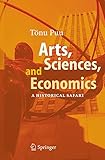Arts, Sciences, and Economics : A Historical Safari / by Tönu Puu.
Tipo de material: TextoEditor: Berlin, Heidelberg : Springer Berlin Heidelberg, 2006Descripción: xii, 193 páginas 54 ilustraciones recurso en líneaTipo de contenido:
TextoEditor: Berlin, Heidelberg : Springer Berlin Heidelberg, 2006Descripción: xii, 193 páginas 54 ilustraciones recurso en líneaTipo de contenido: - texto
- computadora
- recurso en línea
- 9783540344247
- HB71-74
Springer eBooks
Culture and Civilization -- Public Goods -- Patronage -- Changing Attitudes -- Evolution in Science -- Perfection in Art -- Economic Principles.
The book deals with economic aspects of changing attitudes in arts and sciences. The effects of the public good character of culture, along with the very long production period and lifetime for its products, are emphasized, as both contribute to the failure of normal market solutions. Embodiment of ideas, and the consequences of modern reproduction technology for protection of property rights are focused. The evolution within arts and sciences, which often seems to return to previously scrapped ideals, is illustrated by detailed case studies, where the importance of changing tastes, rather than progress proper, is emphasized. An understanding for this is attempted by using Darwinian evolution in combination with modern mathematical complexity theory. The use of the latter is, however elementary, so no reader needs to be set back through mathematical formalism.
Para consulta fuera de la UANL se requiere clave de acceso remoto.


